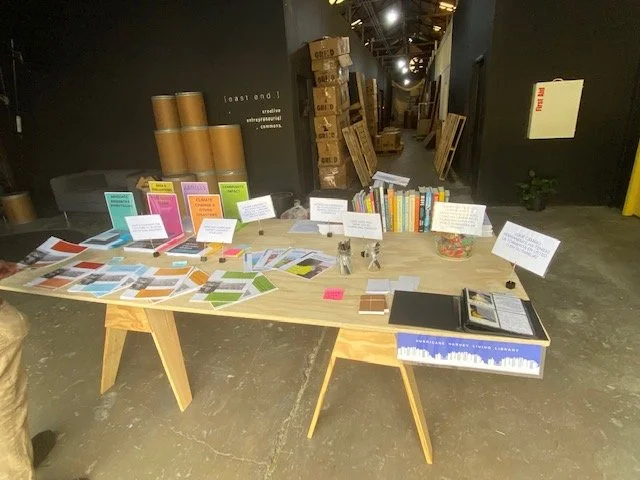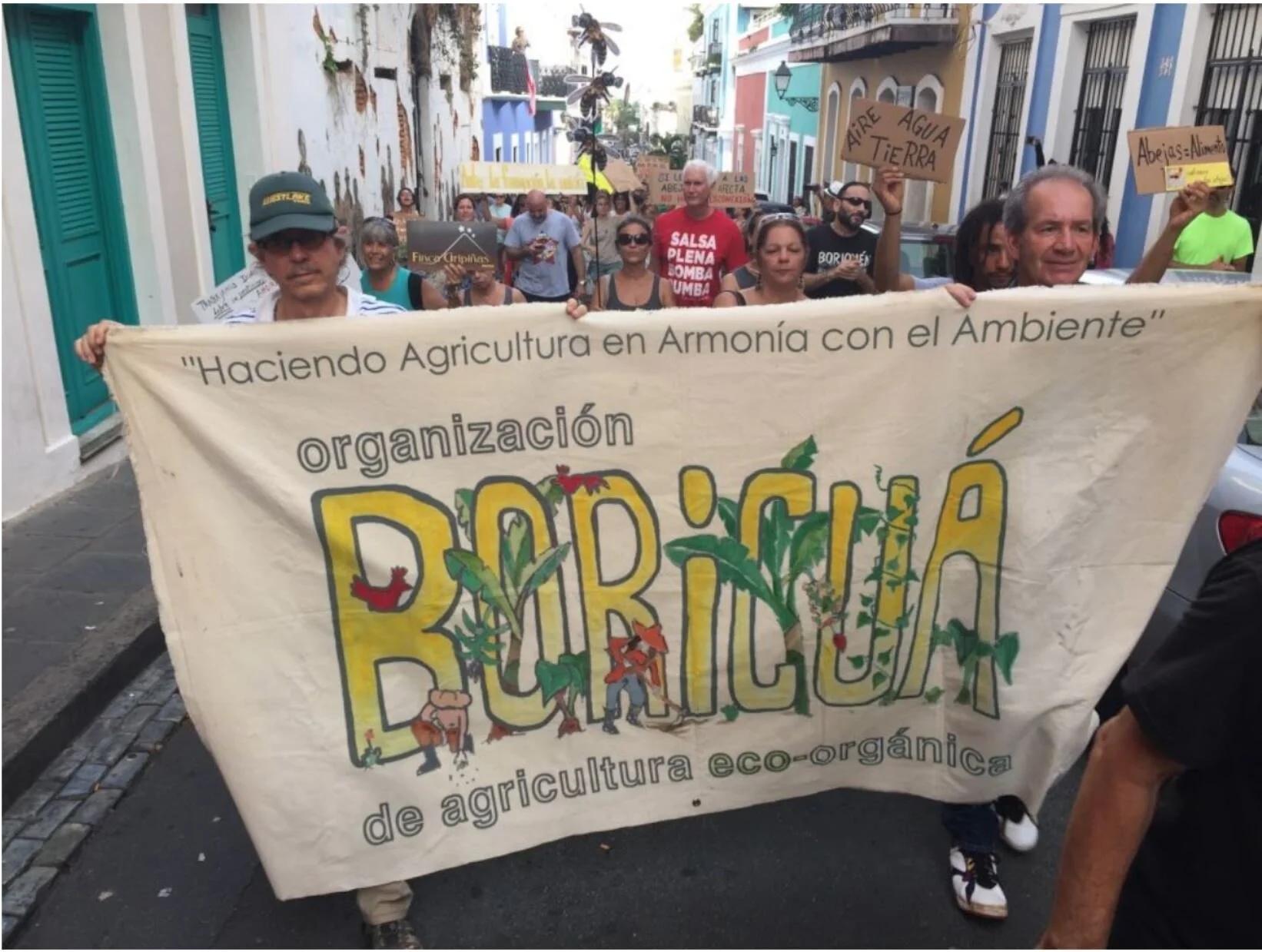This past April, we had the honor of welcoming the EJ Disrupt Design Fellowship (EJDD) to our land, Borikén (Puerto Rico). As EJDD host committee chairs and tech coach, this experience was a collective invocation of memory, place, ancestry, and shared struggle across waters and generations.
Read MoreAt Miltecayotl, the essence of the milpa is more than just a name; it is a guiding principle. This January, we stood alongside farmworkers, the original macehualli of our sacred Mother Earth, to provide support through our Farmworkers’ Food Distribution program. On January 17, 2025, Miltecayotl distributed 191 boxes of food to 793 individuals across 17 different zip codes in Arizona. Each box, whether destined for a family of two or ten, was more than a collection of essentials—it was a testament to the resilience and dignity of the people we serve.
Read MoreAs we transition into a new season and year, I want to share an important update about my professional journey with the broader Tishman Center community.
I am thrilled to start a new role as the Resource Mobilization Officer at the Global Alliance for Incinerator Alternatives (GAIA), an organization I've known and admired for a long time. My work will focus on resourcing GAIA’s mission to catalyze a global shift toward environmental justice by strengthening grassroots social movements that advance waste and pollution solutions, working across the globe. In this role, I will continue my efforts to move philanthropic resources to be more justice-centered, equitable, and accessible to the broader climate and environmental justice movement. This career shift feels like a natural continuation of my work here, as GAIA’s values deeply align with those of the Tishman Center.
Read MoreThis important moment following the elections calls for our steadfast commitment and solidarity with our communities of practice and partners.
Read MoreIn light of recent disheartening news, the Supreme Court's decision to overturn the Chevron Doctrine—severely restricting the EPA and other federal agencies from protecting our environment and public health—it's essential to find and share stories of hope and resilience. One such story comes from Darryl Molina Sarmiento, the 2024-2026 EJ Disrupt Design Fellow and Executive Director of Communities for a Better Environment (CBE).
Read MoreAn article by Dr. Ana Baptista, Associate Professor and co-director of the Tishman Center, was recently published in the open-source book Toxic Heritage: Legacies, Futures, and Environmental Injustice (edited by Elizabeth Kryder-Reid and Sarah May).
Dr. Baptista’s chapter “Environmental Justice Tours: Transformative Narratives of Struggle, Solidarity, and Activism” reflects on the power of Environmental Justice (EJ) tours to symbolically and concretely counteract the marginalization of communities that live in frontline EJ communities.
Read MoreDr. Ana Baptista, co-director of the Tishman Center, has recently been featured on the Resources Radio podcast with host Margaret Walls. In Episode 219, “Environmental Justice and the Cumulative Impacts of Pollution”, Ana breaks down the definition of “cumulative impacts”, why they are a particularly tough problem for overburdened communities to combat, and how environmental justice movements have successfully pushed for greater cumulative impacts legislation in recent years.
Read MoreIn January 2023, Critical Planning published my article “Evaluating Meaningful Engagement Under Environmental Justice Mandates: A Case Study of California’s SB1000 Implementation in Santa Ana”. The article is connected to environmental justice (EJ) advocacy that fellow EJ organizers and I led in Santa Ana, CA.
Read MoreAfter decades of climate inaction, the United States has reached a turning point with the passage of multiple federal laws that provide funding for clean energy. However, environmental and climate justice activists are wary, warning that these laws may further subsidize false solutions to addressing the climate crisis. Legislation like the recently passed Inflation Reduction Act is riddled with technological and market-based approaches that further exacerbate existing vulnerabilities in environmental justice communities
Read MoreWith many of the Tishman Center’s research assistants (RAs) scattered across the country for summer break, we wanted to highlight some of the environmental justice activism happening in our hometowns. On August 26 in my hometown of Houston, Air Alliance Houston, the Climate Justice Museum, and One Breath Partnership collaborated to hold “5 Years After Landfall”: a collective reflection on the catastrophic events of Hurricane Harvey in 2017.
Read MoreDuring the Week of September 20-24th, The Tishman Center will be working on promoting events around Climate Week. Please join us for these opportunities to connect over events such as one related to how the climate crisis is affecting the African diaspora, an event on Urban Resilience, a virtual open house and more.
Read MoreOn March 29, 2021, Pratt and the New School collaborated on an event which is part of the Communities Beyond Crisis speaker series. In this event titled “Agroecology and Food Sovereignty Following Disaster”, speakers Ana Elisa Pérez Quintero, Magha García Medina, and Elda Guadalupe Carrasquillo discuss how they work towards food sovereignty in Puerto Rico.
Read MoreThe last few decades have seen an exponential rise in the deployment of wind energy worldwide, mostly through the development of large-scale wind farms. Onshore wind is land-intensive: because wind energy is more dispersed than fossil fuel energy, it has significant spatial requirements, and with those requirements come an increasing number of conflicts—from the Americas to Asia, Africa, and Europe (Avila 2018). Two key features of these conflicts are pressures on land and patterns of uneven development, which create problems of space and justice (Avila 2018).
Read MoreTishman Environment and Design Center is proud to announce, with our partners, The Equitable and Just National Climate Forum, and the Center for American Progress, the release of a set of recommendations to the Biden-Harris administration for how they can effectively implement their commitment to environmental justice and the successful implementation of the Justice40 Initiative. The set of recommendations was developed with environmental justice (EJ) advocates, academic experts and national environmental groups.
Read MoreThe “Curriculum of the Anthropocene” event kicked off the Tishman Center’s 2021 Earth Week programming. We invited four New School faculty members to discuss how the New School’s curriculum could be altered to better prepare students to deal with the Anthropocene - a geological time period wherein human activity has undeniably affected Earth’s climate and environment.
Read MoreAudrea Lim, a journalist that focuses on climate and land issues, has curated an environmental anthology called “The World We Need”. Interestingly, Audrea made sure to bring in collaborators that don’t necessarily consider themselves “environmentalists”. Hear the stories from the collaborators themselves..
Read MoreThe Tishman Center’s 2021 Earth Week is here! This year the theme is Transitions to Climate and Social Justice. Here’s a preview of the events.
Read MoreIn Fall ‘19, faculty grants were awarded to support four projects related to the Tishman Center’s mission. One of those projects, “Developing Milano’s ‘Whole Earth’ Curriculum” was led by Leonardo E. Figueroa Helland (Milano/EPSM Faculty), and Mindy Fullillove (Milano/Urban Policy Faculty). As part of the project, a task force was created to investigate how the New School can reexamine its curriculum with a focus on climate justice, as well as to evaluate the school’s contribution to climate justice and its role in the greater community.
Read MoreAs Biden enters his presidency in the middle of a pandemic, many of his actions in the first two weeks have addressed COVID-19 and the economy. However, this has not stopped Biden from tackling the climate crisis. On his first day as President, Biden set a clear environmental priority by rejoining the Paris Climate Accord and cancelling the Keystone XL Pipeline. Moreover, he is prioritizing science in the political process and assembling a “Climate Cabinet”.
Most importantly, Biden recognizes that environmental justice is a vital part of the climate crisis. On his campaign trail, Biden proposed a 4-part Environmental Justice Plan. A week into his presidency, Biden released an Executive Order regarding the climate crisis, which included orders regarding environmental justice. When comparing the executive order against the plan, we found that Biden took action in each part of his environmental justice plan. The article compares how his actions have stacked up to his campaign promises so far.
Read MoreWe are in a pivotal moment where things once unimaginable are now undeniable. We can't continue to rely on technocratic approaches that have proven ineffective or that only make superficial change. To build a just world, we need people-centered strategies that challenge the political, social, and economic leaders and systems that produced decades of environmental racism and inaction on climate change. Environmental Justice Movement leaders, specifically the people who are closest to the dangers of climate change, should lead us in identifying solutions.
Read More



















